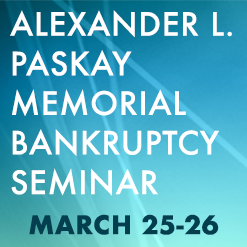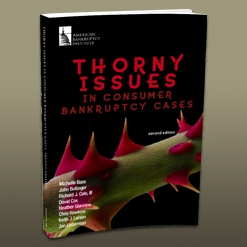| |
| |
| vol 19, num 1 | March 2021 |
| |
|
|
| |
|
|
|
|
|
| |
| CARES Act in Chapter 13 |
| Regarding chapter 13, the Coronavirus Aid, Relief, and Economic Security Act (CARES Act) in part allows chapter 13 debtors experiencing a material financial hardship as a result of the COVID-19 pandemic to modify the length of their bankruptcy plan to a maximum of 84 months, up to an additional 24 months if the plan was initially set at 60 months, or up to 48 months for those debtors in previously confirmed 36-month plans. One of the caveats to this Code amendment by the Act provides that a plan sought to be modified must have been confirmed before March 27, 2020, the date that the CARES Act was enacted. Most plans in the Western District of
Tennessee’s Western Division in Memphis are set at 60 months. |
| |
|
|
|
|
| |
|
| |
| Who CARES About Forbearance Claims |
| The Consolidated Appropriations Act of 2021 (CAA), which passed in Congress on Dec. 27, 2020, introduced some noteworthy additions to the Bankruptcy Code. One such issue is the changing relationship between chapter 13 debtors and mortgage lenders when it comes to forbearance requests under the Coronavirus Aid, Relief, and Economic Security Act (CARES Act).
The Code Gets More Defined
The CARES Act provides federally backed mortgage borrowers experiencing pandemic-related financial difficulties a mechanism by which to temporarily postpone mortgage payments.
|
| |
|
|
|
|
| |
|
| |
| When Does a Reaffirmation Agreement Become Enforceable and Effective? |
| When a debtor reaffirms a dischargeable debt, this means the obligation will survive discharge and continue to be enforceable. To protect debtors from compromising their fresh start by making unwise agreements to reaffirm and repay otherwise dischargeable debts, the Bankruptcy Code sets out lengthy disclosure requirements for reaffirmation agreements.
Once a reaffirmation agreement is signed and filed with the court, many creditors wonder how long they need to wait to transfer the account back to normal servicing status. Section 524 of the Bankruptcy Code contains references to when a reaffirmation agreement is “effective” and when it is “enforceable.” Since the case law shines scant light on the distinction between these two terms, the focus must be on the statutory language itself.
|
| |
|
|
|
|
| |
|
| |
| Income Disruption in an Ongoing Pandemic: Plan Modification, or Hardship Discharge? |
| One year into the economic crisis caused by the COVID-19 pandemic, unemployment rates have already surpassed the high levels seen during the Great Recession in 2009. Like everyone in this country and around the world, debtors are struggling.
Section 1329 of the Bankruptcy Code allows for post-confirmation plan modifications. For most debtors, the proposed modification need merely conform with one of the modification provisions of § 1329(a), subject to the discretion of the judge, to be approved. Additionally, Congress amended § 1329 with the CARES Act, allowing for debtors whose plans had already been confirmed by the date of the enactment of the CARES Act to extend their plan terms to a maximum of 84 months if the debtor “is experiencing or has experienced a material financial hardship due, directly or indirectly, to the coronavirus….”
|
| |
|
|
|
|
| |
|
| |
| Hurlburt’s Unheralded Takeaways A Renewed Defense of Witt’s § 1322(c)(2) Limitations and a Revealing Clash of Interpretive Methodologies |
| In the wreck of the Great Recession, numerous borrowers sought to avoid their homestead’s foreclosure despite material payment defaults. Many took advantage of chapter 13, which empowers, inter alia, an individual with a regular income to cure precisely such failures over time under § 1322 (b)(5). With the housing market’s contraction temporarily cratering property values throughout the nation, debtors saw this subsection as the means by which to simultaneously reduce the total mortgage secured by their homes to its newly depressed market values and discharge the reminder of the secured loans. This widely held belief prompted much
concluded and ongoing litigation, including the overruling of 22-year-old precedent by a majority of the sitting judges of the U.S. Court of Appeals for the Fourth Circuit in Hurlburt v. Black (In re Hurlburt). |
| |
|
|
|
|
| |
|
| |
| Register Today for ASM! |
|

|
| ABI is pleased to announce the return of the Annual Spring Meeting from April 12-22 — this year in a cutting-edge virtual format. Employing the same innovative platform that made last fall’s Insolvency 2020 event such an astounding success, this conference — always one of the most significant annual gatherings of bankruptcy and insolvency professionals in the country —
will introduce a number of new and improved online networking features.
This year, the Consumer Bankruptcy Committee will be partnering with the Legislation Committee to host a panel titled "ABI’s Commission on Consumer Bankruptcy vs. the Consumer Bankruptcy Reform Act."
- Speakers for this panel include:
- Moderator: Christopher L. Hawkins,
Bradley Arant Boult Cummings LLP; Birmingham, Ala.
- Hon. Rebecca Connelly, U.S. Bankruptcy Court (W.D. Va.); Harrisonburg
- Marcy Ford, Trott Law; Farmington Hills, Mich.
- Henry E. Hildebrand III, Chapter 13 Trustee; Nashville, Tenn.
- Ariane Holtschlag, Factor Law; Chicago
|
| |
|
|
| |
|
| |
| ABI Podcast: Experts Examine Important Consumer Bankruptcy Law Changes Enacted in December |
| Legislative measures throughout 2020 were aimed at providing economic stability to meet the challenges of the financial distress caused by the COVID-19 pandemic, and December saw a flurry of activity that resulted in the Combined Consolidated Appropriations Act of 2021. The $2.3 trillion spending bill combined $900 billion in stimulus relief for the COVID-19 pandemic with a $1.4 trillion omnibus spending bill for the 2021 federal fiscal year. The bill passed both chambers of Congress on Dec. 21 and was signed into law by the President on December 27. Within the nearly 5,600 pages of this bill were important changes to the Bankruptcy Code. In this
podcast, ABI Consumer Committee Co-Chair Christopher L. Hawkins of Bradley Arant Boult Cummings LLP (Birmingham, Ala.) discusses the changes with Charissa Potts of Freedom Law, PC (Eastpointe, Mich.) and John Rao of the National Consumer Law Center (Boston). |
| |
|
|
| |
|
|
|
|
|
|
|
|
|
| |








